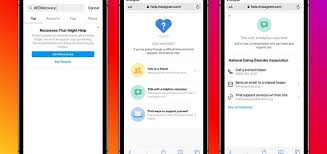This week (February 22nd-28th), is National Eating Disorders Awareness Week, which aims to put a spotlight on eating disorders in order to raise awareness and educate the public on the need for support and assistance for those in need.
Around 1 in 7 people will experience an eating disorder of some kind in their lifetime, whether that’s through food avoidance or more extreme conditions. Media representation, including social media, can play a big part in this, by exposing young people, in particular, to certain body image types, and facilitating comparison. That puts networks like Instagram and TikTok in particular in a position of significant influence in this respect.
In line with this, Instagram, Pinterest and TikTok have this week outlined new initiatives as part of NEDA Week, including new support tools and resources to help users who may be experiencing issues.
Here’s what’s been announced:
From today, Instagram is adding a new set of resources that will be displayed in searches related to eating disorders or body dissatisfaction.
As you can see in this example, when a user searches for a related hashtag or topic, Instagram will now show a new prompt that can connect the user to helpful guides and further contacts.
As explained by Instagram:
“These new resources will include contacts for local eating disorders hotlines in certain countries, such as Beat in the UK, National Eating Disorder Information Centre in Canada and Butterfly Foundation in Australia, as well as new advice on how to build body confidence that we built in partnership with the National Eating Disorders Association (NEDA) in the US.”
The new prompts will also be displayed when users go to share related content, while Instagram is also working to add a new option to send a link to these tools via DM.
In addition to this, Instagram is working with influencers and community leaders throughout the week to distribute Reels that encourage positive body image.
Instagram additionally notes that it does not allow content that promotes or encourages self-harm and eating disorders, which has been a key focus for the platform over time.
Pinterest, meanwhile, is partnering with the National Eating Disorders Association to launch a series of Story Pins designed to generate awareness of eating disorders and provide educational and support links.
As you can see here, these interactive Story pins will encourage users to share their own experiences, and tag others on the platform, while also providing educational insights into the fight against such conditions.
Pinterest is also donating ad credits to help encourage people to tune into NEDAwareness Week events, while like Instagram, Pinterest is also adding helpful resources that will be displayed to relevant search queries on the platform.
TikTok
Lastly, on TikTok, the platform is also adding new connection tools that will show up in relevant search queries, along with new tips and advice guides to assist those who may be experiencing body perception issues.
As explained by TikTok:
“Starting this week, when a user searches for #edrecovery #proana or other phrases related to eating disorders, we’ll provide access to the National Eating Disorders Association Helpline where they can find help, support, and information about treatment options.”
As you can see in the last frame above, TikTok’s also adding new resources that will be accessible via the Discover page for this week. TikTok says that it’s also adding permanent public service announcements on hashtags related to eating disorders which will provide a connection to relevant resources and assistance tools.
As noted, eating disorders are a major concern, especially for younger, more impressionable users, which makes visually-focused social platforms a key tool for comparison, making these initiatives even more important. Anything that can be done to reduce those impacts is a positive step – while a larger, and maybe more effective push, could see more clear labeling on any digitally enhanced images uploaded to social networks.
Such initiatives are being investigated, but either way, these new tools are another positive step.

I don’t think the title of your article matches the content lol. Just kidding, mainly because I had some doubts after reading the article.
Thanks for sharing. I read many of your blog posts, cool, your blog is very good.